

|
FOOD AND YARD WASTE CAMPAIGNS
|
Keep Compost O'Natural! Produce Sticker Trading Card |
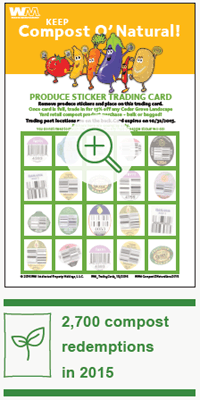
The Keep Compost O'Natural! Produce Sticker Trading Card was developed to educate
customers on a main source of contamination found in compost: plastic stickers on
produce. Customers were prompted to fill up their card with produce stickers and then
redeem it for a free bag of compost at the Cedar Grove landscape yards.
In March, 2015, the incentive program garnered national attention through a story in the
New York Times, "Even Composting Comes with Sticker Shock." Throughout the year,
customers continued to bring in the card and even created their own homemade sticker
cards, for a total of 2,700 redemptions in 2015. After surprisingly high engagement, Cedar
Grove found that they were unable to continue giving out free bags of compost at the rate
of customer participation.
In June 2015, a final version of the card was created, offering a 15 percent discount with
an expiration date of October 31, 2015. The card was distributed at Waste Management's
Recycling Information Station at fairs, festivals and farmers markets. The Produce Sticker
Trading Card was a highly successful awareness tool; however, the majority of customers
were more enticed by free, rather than reduced, compost. Only 12 customers redeemed
their card for a discounted bag of compost.

|
|
"I'm a Foodcycler" Campaign
|
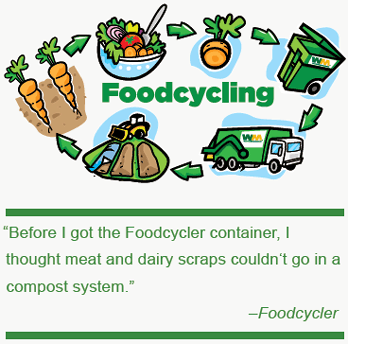
To motivate King and Snohomish County residents to continue
composting and make lasting behavior changes, Waste
Management continued its successful Foodcycler campaign.
In early 2015, Waste Management selected a carrot to replace
the apple in the Foodcycling logo due to a request from the
Washington Department of Ecology (WDE). The hope for this
replacement is to prevent resident confusion over WDE's efforts
to keep maggot-infested apples out of the compost collection.
Throughout the year, a total of nine e-blast communications were
sent to Foodcyclers to regularly communicate announcements
and curbside composting tips and tricks. The open rate for these
e-blasts averaged 40 percent, twice the industry standard. An
early November e-blast titled, "Tips on Confusing Items," had a 51
percent average open rate (155 percent higher than the national
average), and resulted in over a dozen individual responses from
Foodcyclers.
In late July, the Waste Management team sent an email survey to
5,440 Foodcyclers in King and Snohomish Counties to find out if
they were still composting, if they knew proper techniques, how the current program was working and what would motivate them to
do more. 930 Foodcyclers completed the survey for a 38 percent completion rate. More than 90 percent of Foodcyclers reported
using their kitchen container to compost food scraps daily. The survey also showed that many customers are now advocates
for composting-a large number of respondents said they are spreading the word to friends and family members. Quotes from
Foodcyclers in response to e-blasts, including the survey, were compiled into a one-page flier to help urge additional WUTC
residents to take the Foodcycling pledge and join the community of composters.
|
|
All You Can Shovel
|


For the third year in a row, Waste Management teamed
with Cedar Grove to host the popular All You Can Shovel
event. On August 6, a special postcard was mailed to
37,622 Snohomish County food and yard waste customers,
inviting them to shovel a vehicle-load of free compost at
the Cedar Grove composting facility in Everett. On August 15, 327 households attended the event, shoveling approximately
350 yards of free compost and receiving tips and tools on curbside composting. This educational event helped customers see
how the food scraps and food-soiled paper that they add into their curbside compost cart can be transformed into nutrient-rich
compost for yards and gardens.
|
|
Compost Days
|
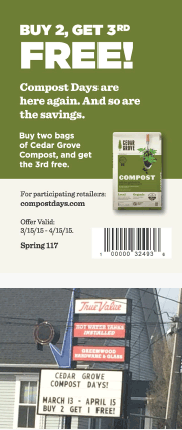
|

From March 15 to April 15, 2015, Waste
Management, King County, Cedar Grove and
Seattle Public Utilities partnered once again to
host the sixth annual Compost Days, a recurring
seasonal promotion designed to educate residents
about the value of composting, increase compost sales and show residents appreciation for their
dedication to curbside composting.
During the campaign, residents could get deep discounts on Cedar Grove compost at 129
participating retailers through a "Buy Two, Get One Bag Free" coupon. For every coupon
redeemed during the campaign, the Big Garden Give compost drive donated a bag of compost to
local gardens growing food for low-income residents. This resulted in 1,119 yards of free compost
donations. Eleven elementary schools with food-growing gardens also participated in the Keep
Compost Clean produce sticker card competition to teach kids about proper composting practices
and to remind them that stickers do not belong in the compost. For every full card turned in to their
teacher, one bag of compost was donated to their school garden. Partnering with 11 area schools
and reaching more than 3,500 students, teachers and parents/guardians, more than 1,200 cards
were turned in, earning 45 truck loads of free compost for school gardens. Multiple TV outlets,
blogs and community papers covered this campaign with a total reach of 5 million impressions.
|
|
Door-to-Door Container Delivery Pilot and Follow-Up Survey
|
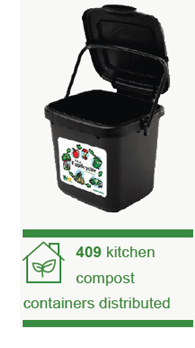
As a follow up to the highly successful direct mail campaign in 2013, which resulted in over 5,000
Foodcycling pledges, the Waste Management team conducted a pilot project to test engagement
and cost through a new distribution method - door-to-door delivery.
In early March 2015, 409 kitchen compost containers were distributed along a Waste
Management route in King County in the Auburn, Wash. WUTC area. The goal of the pilot was
to test the cost and logistics for full route distribution and determine whether customers would
take the pledge if given a container versus using the container as an incentive to take the pledge.
The container included collateral material encouraging customers to take the Foodcycling pledge
online, a flier with Foodcycler quotes, Residential Compost Collection Guidelines and a Bio-Bag™ compostable bag sample. The container and materials were delivered to customers by two outreach staffers over the course of four days. The overall cost for the door-to-door delivery method was $8.71 more per container than the cost of distribution following the direct mail
campaign. The pilot also yielded only two pledges, a .5 percent uptake, which is significantly lower than we have seen with opt-in efforts.
In April 2015, a phone survey was conducted to follow up on the results of the door-to-door
delivery. During the survey, the majority of customers said they composted using the container
given to them or one they already had and uses the container daily, though, they have no interest
in taking the Foodcycling pledge. Customers expressed an interest in additional incentives and
being contacted via direct mail. A direct mail incentive postcard was then sent to customers
offering the incentive of a one month or a six month supply of free compostable bags which resulted in 18 more pledges.
The pilot determined that customers are more likely to become and stay engaged when they opt-in to a composting program, and
direct mail with an incentive is the most effective way to engage customers. The difference in pledge responses between the 2013
direct mailer and the tactics used in the 2015 Auburn Compost Pilot confirms that the promise of a free kitchen compost container,
closely followed by compostable bags, is a strong incentive for encouraging customers to take the Foodcycler pledge and become part
of Waste Management's ongoing dialog around composting.
|
Organics Pilot
|

To further test the information and recommendations gained from the 2013 Behavior Study
and Foodcycling pilot, Waste Management developed a plan for a broader food composting
pilot to inform the development and implementation of future behavior change campaigns under
the RSA.
The purpose of the pilot was to conduct outreach to a targeted group of customers to determine which educational methods and
tools are most effective in creating the desired behavior changes - set up an in home composting system and compost food
scraps daily. The pilot plan evaluation phase focused on using pre- and post-pilot route collection data and/or garbage sorts to
test the effectiveness of frequency and method of communication with customers along with education resources and tools. The
pilot was to be conducted with Waste Management WUTC single-family customers in King County. In fall 2015, it was determined
that King County would prefer to focus organics piloting efforts on cart tagging only, versus testing various communication
methods. As a result, a comprehensive cart tagging pilot plan was created and approved in late 2015.
|
|
Cart Tagging Pilot
|
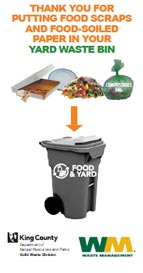
|
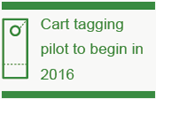
In lieu of the original organics pilot plan, King County requested
that Waste Management develop an organics pilot that focuses
on cart tagging. This plan was developed in late 2015 to begin
implementation in early 2016.
The pilot will test the effects of placing cart tags on curbside carts
along two residential collection routes at two different frequencies — quarterly and biannually — over the course of one year. The primary communication tool used will be a custom cart tag. The tag will be designed as a "prompt" to educate and remind residents that food scraps and food-soiled paper should be placed in the yard waste cart.
The pilot will utilize similar tactics and materials as pilots happening simultaneously with Republic
Services and Recology. The hope with this approach is that the study differences can be minimized
so that pilot results can be extrapolated across a wider geographic area. The pilot project will involve
three residential collection routes (two test routes and one control) located in WUTC areas of
Redmond, Woodinville and Sammamish.
|
|
|
|

 |

|
 |
| © 2016 WM Intellectual Property Holdings, L.L.C.
|
|